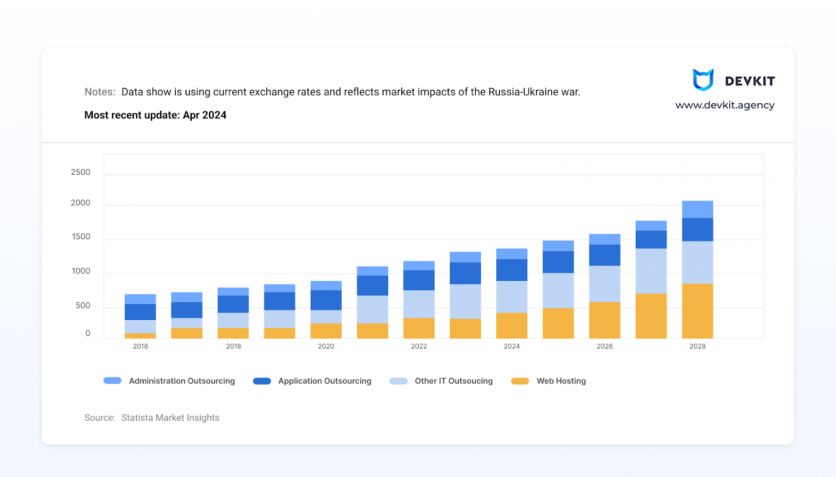
Outsourcing has become increasingly popular in recent years, particularly in the IT and tech sectors. As a result, the technology outsourcing industry has become a crucial component of modern business practices. Currently, numerous US-based companies are turning to offshore talent in countries like Ukraine, Poland, Romania, and Hungary. These companies frequently partner with outsourcing IT firms to tap into a pool of skilled professionals specializing in advanced software development and engineering.
According to a recent survey, the US IT outsourcing market is experiencing significant growth, projected to reach nearly 200 billion U.S. dollars by 2026. Additionally, about 255,400 IT jobs are expected to be created during 2024–2029, fueling the demand for IT outsourcing.

One of the primary reasons outsourcing is so popular among US companies is its cost efficiency. Analysts from devkit.agency reports that the hourly pay rate for European software developers is 25–30% lower than that of their US counterparts. This applies to freelance specialists, agencies, and large IT enterprises alike. Given the comparable proficiency levels, outsourcing to European specialists is a logical choice for many US-based businesses. Such partnerships contribute to increased speed, expertise, and cost-efficiency. Driven by a confluence of factors, IT outsourcing is expected to be an upcoming trend—US companies are looking beyond their borders and turning to Europe for highly skilled IT specialists.
Why is the outsourcing format gaining popularity?
Today, many companies have realized they don't need an in-house development team for every project. With an outsourcing option at hand, they can access a global talent pool and find specialists with the exact skills required for a specific project. This approach eliminates the burden of recruiting and training new employees and excludes the need to manage a large internal team. In addition, outsourcing offers lower development costs and results in significant financial savings in the long run, especially given the high cost of hiring skilled developers in the US.
The ideal structure for many US companies is a hybrid approach—having a small, in-house team of 1–2 specialists that handle crucial tasks such as:
- Setting project goals and defining tasks aligned with the company's overall strategy
- Connecting the in-house team with the outsourcing team to make sure that everyone is on the same page.
- Reviewing deliverables and providing feedback to the outsourced team.
- Translating technical details for internal stakeholders and communicating project progress effectively.
Outsourcing is no longer solely about cost savings. It's about strategic partnering with IT outsourcing companies and enhancing software resources. If executed properly, US-based companies and EU technicians can achieve remarkable efficiency by combining streamlined workflows with access to a broader range of expertise.
Pros and Cons of Outsourcing Development to EU Companies
Outsourcing development involves a complex decision-making process with several factors to consider. Here's a breakdown of the pros and cons of outsourcing that may help you decide if this approach aligns with your project needs.
Pros:
- Cost Efficiency. Outsourcing to Europe is often much cheaper than building an in-house team, especially for US-based companies.
- Rich Talent Pool. EU-based outsourcing providers offer a vast pool of highly skilled software engineers with expertise in various technologies.
- High Level of Expertise. With a broad skill set and proficiency in software development, European software engineers can handle a wide range of tasks.
- Good Work Ethic. European software professionals are known for their dedication to delivering high-quality work, maintaining steady progress, and completing projects on time.
- Multilingual Teams. Fluency in multiple languages among European teams eliminates communication barriers and simplifies collaboration.
Cons:
- Different Time Zones. Managing projects across different time zones, especially for US companies, can pose collaboration challenges and potentially slow down project progress.
- Mentality & Cultural Differences. Cultural variations in work styles may lead to miscommunication or misunderstandings if not properly addressed.
- Lack of Control. A lack of clarity in task definition and organization can lead to potential issues in the development process.
How to find and choose a reliable software development agency in Europe?
While cost remains a factor, the modern approach to outsourcing emphasizes finding a reliable and trustworthy partner. Resources like LinkedIn, Clutch, and Upwork can help you find reputable agencies in Europe since most companies showcase their expertise, experience, and client testimonials on the mentioned platforms. Positive client reviews and case studies are also important factors and demonstrate that your potential outsourcing partner has a history of successful projects and a commitment to client satisfaction.
When evaluating outsourcing companies, social media presence is a big factor in 2024: look for digital content that demonstrates expertise and commitment to keeping their audience informed. Additionally, contact previous clients to inquire about their experiences and satisfaction with the company's services. A complex approach that includes social media and client feedback analysis provides a clear picture of a potential outsourcing partner's professionalism and expertise.
If you are ready to access specialized skills, optimize costs, and free up internal resources for strategic initiatives, connect with the DevKit team to discuss your specific needs and project requirements.
ⓒ 2026 TECHTIMES.com All rights reserved. Do not reproduce without permission.





